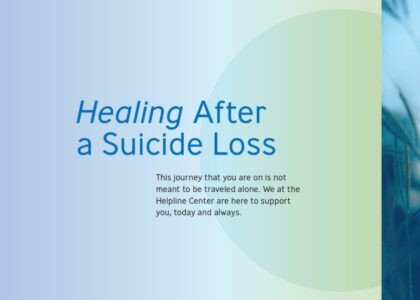There are many misconceptions around suicide grief, what it is and what it isn’t. Here are some ‘Truths’ from one survivor to another.
Grief and mourning are not the same
Grief: Mixture of internal thoughts and feelings people have when someone they love dies; the internal meaning given to the experience of loss.
Mourning: Outward expression of grief. A few examples would be talking about the loved one you lost, crying, expressing your thoughts through performing or visual art, or celebrating important dates.
Grief comes naturally; mourning requires a conscious effort. Acknowledging the loss of someone you love, both to yourself and to others around you, allows you to process your grief and honor the loss.
Grief and mourning do not occur in orderly, predictable stages
Grief, especially suicide grief, is not linear. For so long, we have been told that grief happens in five stages, which implies that there is an ending to it— which there is not. Your first interaction with suicide grief will likely feel overwhelming, knocking your world off its axis. With time, you will slowly start feeling like you are adjusting to the new world you are living in, but with difficulty. Yet, at times, out of nowhere, waves of emotions (such as regret, anger, loss, loneliness, guilt, etc) may overcome you and bring you back to the place you were in initially. That is normal. It may surprise you and scare you; it is critical to remember that with support and intentional care for yourself, it will become easier to recover from those grief bursts each time.
The “whys” of a suicide death may never be determined
There are so many factors, biological, environmental, personal, and psychological, that can increase one’s risk of suicide. That means that deciphering “why” an individual may take their own life becomes complex, and oftentimes is impossible. Although “the last straw” may appear to be the only reason for a suicide, typically there are many additional, unseen layers that play a role.
Guilt is not a required part of the grieving process
Many survivors following their loved ones death by suicide faces the question: “Do you feel guilt?” This question can feel as if people are implying that survivors should feel guilty, when the truth is that friends, family, and caregivers may have tried very hard to encourage their loved one to receive help and treatment to avoid suicide.
All kinds of people complete suicide
Suicide does not discriminate. It is not limited to any one demographic background.
You do not have to struggle with a mental illness to complete suicide
Many times, folks blame deaths by suicide on mental health conditions, yet not every death by suicide is a result of a diagnosed mental illness.
Suicide grief should be experienced, not avoided
Closely following the death, many survivors are encouraged to “get back to normal.” We are taught to move on from death because many people are uncomfortable with grief and mourning. However, healing at your own pace, on no particular schedule is valid. Minimizing our grief leads to further, deeper isolation in the journey. Acknowledging and accepting the loss are the only things that will truly let you weave your suicide loss into the fabric of your life. In order to heal in grief, you must be open to feeling your grief.
Birthdays, holidays, anniversaries, and other special days should be observed
Honoring and acknowledging special days can bring you peace, whether you do it individually or in the company of supportive friends. The anticipation of upcoming important dates can come with anxiousness or fear, that is normal. It is common for there to be more stress over what you imagine yourself feeling, yet when the actual date comes it provides you a sense of relief.
You will never get over this, but you will not always feel as you do now
Many of us are taught to search for a closure that does not exist. A survivor will never be able to “get over” or “move on” from the death of a loved one by suicide. The truth is, survivors will continually feel grief over their loss. That being said, there will come a time when the grief will no longer consume your life in the way it did initially; grief will be present in a healthy way that demonstrates the deep love you shared for and with the person who died. Grief gets harder before it gets better, and over time some of the anger will diminish as the happy times begin to surface. Your grief was not meant to be overcome, it was meant to be experienced.



